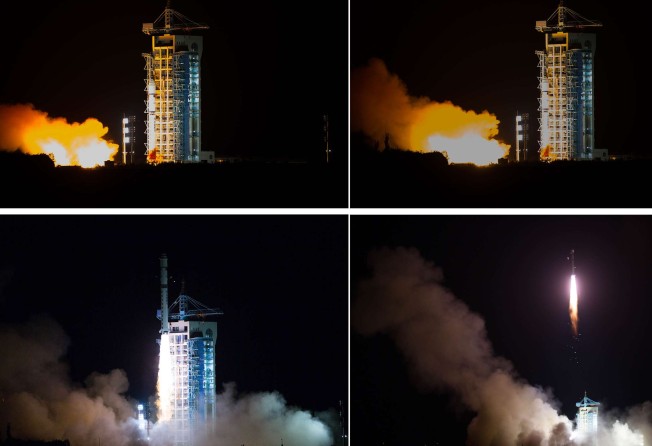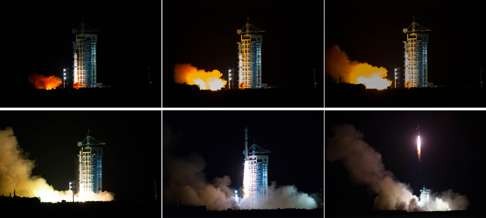How quantum satellite launch is helping China develop a communications system that ‘cannot be hacked’
Scientists believe that using technology harnessing quantum physics is the key to beating electronic snoopers

The launch of the world’s first “quantum satellite” is just the beginning of China’s ambitious plans to develop a communications system that cannot be cracked by hackers, according to a lead engineer on the project.
The satellite was launched from the Jiuquan space centre in Gansu province in northwest China early on Tuesday morning, state media reported.
One of the tasks during the satellite’s mission will be to try and send coded communications back to earth that cannot be read by eavesdroppers, the state-run news agency Xinhua reported.
It will attempt to do so by transmitting information through photons, tiny particles found in subatomic or quantum physics.
Researchers believe that information sent through photons cannot be intercepted or analysed by people without the right codes.
Lead engineer Dr Wang Jianyu told the South China Morning Post he has had barely any sleep before the launch, due to excitement and anxiety.
“The rocket team has done a great job, putting the satellite perfectly into the designated orbit.
“We also switched on the satellite’s main power supply for the first time and the initial signals look good,” said Wang, who led the development of scientific instruments on board the satellite.
“It’s too early for celebrations because the show has just begun with many challenges waiting for us ahead, some never encountered by humans before.”
The mission to establish a hacker-proof communication link between space and earth requires scientists to carefully adjust the satellite’s position so it can beam single photons on to a targeted area just a few square metres wide on the ground.
They also need to test and fine tune each scientific device on the satellite and this could take more than two months. “We are under a lot of pressure because the world is watching,” said Wang.
The quantum satellite project forms part of China’s efforts to produce a communications system for the military and security sectors using quantum technology.
A ground communication network between Shanghai and Beijing has already been set up using photon technology and is successfully operating, according to Xinhua.
Similar ground-based quantum communications systems have also been set up in the US, Europe and Japan, but China has the largest network and is leading the development of the technology in space.
Professor Pan Jianwei, a quantum physicist who led the development of the satellite, said the communications technology would eventually benefit everyone on the planet.
“In the beginning, [the technology] will be applied in the commercial, finance and military sectors, [but] this is a scientific breakthrough, anyone can use it,” he was quoted as saying by Xinhua.
“Five years on, many government agencies will use it. Fifteen years on, it should enter ordinary households with everyone’s mobile phone having a quantum chip for information encryption to protect their privacy.”
To be a quantum hacker you must have a PhD in quantum physics, that’s the minimum requirement. Such a high entry barrier will keep most hackers out of this game
Dr Vadim Makarov, an expert in quantum communications at the University of Waterloo in Canada said existing electronic systems such as telephones were easy to hack because each piece of data was carried on electrons, which can be intercepted and analysed.
“A wiretap splits off a large number of electrons to read the signal and still leaves enough electrons in the line to carry the same signal to the legitimate recipient,” Makarov said.
A quantum network, however, carries information by photons and under the law of quantum physics it is impossible to measure their properties without altering them.
“If an eavesdropper tries to copy the quantum states, this introduces errors in the transmitted key and gets noticed by the legitimate users,” said Makarov.
He is researching if it is feasible to hack quantum communications.
He and other scientists believe the only weakness lies not in the quantum signals, but the hardware that collects and processes them.
Markarov called one possible way of hacking the system a Trojan Horse. It involves firing an extra beam of light at one key part of the communications equipment and light reflected back would carry information processed by the system.
He admitted, however, that it was highly unlikely that China’s system could be hacked.
“As far as I know, there is no security concerns from a third party to the Chinese network at the moment,” he said.
Dr Ma Xiongfeng, assistant professor of physics studying quantum network security at Tsinghua University in Beijing, said all attempts at hacking so far had been carried out by researchers in laboratories.
“Most of them are unlikely to work in the real world because their effectiveness depends on many assumptions on the targeted machine, which varies from one place to another,” he said.
“Commercial quantum network applications had been deployed in many countries, but not a single report of a security breach had been reported so far.”
Professor Li Chuanfeng, another quantum physicist, said the level of expertise needed to attempt a hack would be huge.
“To be a quantum hacker you must have a PhD in quantum physics, that’s the minimum requirement. Such a high entry barrier will keep most hackers out of this game,” he said.
The battle to create secret codes and break them has gone on for centuries, from the ancient Greeks to the Nazi’s Enigma machines during the second world war.
A quantum network has given the upper hand to code makers “for the first time,” said Li.
